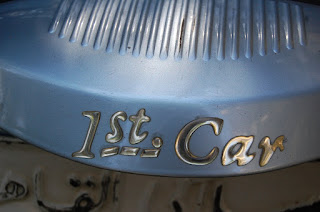Funkengroovin Wednesday - Preview
For full articles or more pics, click on the links.
 Sixty Years of the VW Camper
Sixty Years of the VW Camper
July 30, 2007 It was precisely 60 years ago this week that Dutch Volkswagen importer Ben Pon discovered a vehicle at the Wolfsburg factory, which Volkswagen staff had built for their own use to transport heavy panels around the site. It was this vehicle that provided the catalyst soon afterwards for the first sketch and concept of the "Bulli" (affectionate term for the Volkswagen Camper - the "Kombi" in Australia!), later to become the driving force of the economy, vehicle of choice for the flower power generation, holiday camper and people carrier. Volkswagen Commercial Vehicles has used the unparalleled history of this vehicle as an opportunity to organise an international VW Camper event from 5th to 7th October at the Exhibition Centre in Hanover.
"Scarcely any other vehicle evokes as many emotions as the VW Bulli. Back then it stood for new departures, economic success, independence as well as fun and travel. It is pleasant, reliable and a real cult vehicle. We want to establish the unrivalled legacy of our brand with the international VW Camper event and hope to revive the Bulli brand in the future" explains Stephan Schaller, spokesman for Brand Management, Volkswagen Commercial Vehicles.
The action starts on Friday, 5th October when a convoy of historic Bullis will begin their journey from the Volkswagen Commercial Vehicles plant to the exhibition centre. In the evenings open air cinema nights are planned featuring films where the VW Camper has played a starring role. "Little Miss Sunshine", a heart warming American family road trip movie will be the main feature.
On Sunday, 6th October there will be prizes awarded during the day for historical models in "Oldest T1, T2, T3", "Most attractive T1 to T5", "Most original T1, T2, T3", "Furthest journey" and "Pimp my Bulli" categories. Guests will have the opportunity to see the most attractive and unusual VW Campers in the world and learn from their owners why they love this vehicle so much.
Set to share a platform with the next-generation Rabbit and upcoming Scirocco, the 2010 Beetle will once again be styled in California and engineered in Germany, according to our sources. That, however, is where the similarities will end. Despite its overall success as a revival of the iconic original design, Volkswagen is looking to move away from the "chick car" image of the New Beetle.
FOUND ON EBAY, Volkswagen Bug Camper, Episode II: Judgment Day
In rearview mirror, that Beetle was fab oneSure that little putt-putter had flaws, but it didn't deserve to die. It was charming, despite the fact I had to hang my left arm out the window to work the windshield wiper during heavy rains.
I always forgot gloves, but it did have a glove compartment, and I should have kept at least a left one in there for the snow.
I used to talk to my car, under my breath mostly, yet my words had an impact. Even with the window up, I could see them in the mist.
Clarkson and crew attempt to cross English Channel. Emphasis on attemptWell, the three motoring presenters decided to pull their aqua-whips out of retirement to cross the English Channel, and again, two of the three vehicles met their demise at the bottom of the sea. According to various reports, May's Herald and Hammond's VW van went under within the first few minutes, while Jezza was able to stay afloat long enough to stroke his ever-expanding ego.
Zen and the Art of Volvo Maintenance
In the Colorado Rockies, Matt meditates on the purpose of his cross-country trip at the Shambhala Mountain Center, a Buddhist retreat.
WHAT is the sound, asks an ancient Buddhist koan, of one man driving? In my case, for more than 1,500 miles, the answer was a low-frequency whine emanating from my front wheels. The bearings were seizing up, and the Volvo, which had never moved quickly, lurched forward with ever-greater reluctance.
As I headed north toward Colorado, I began to have visions of my wheels suddenly detaching on a narrow pass in the Rocky Mountains. So I checked the car into the Santa Fe Mazda Volvo (2704 Cerillos Road, 505-471-6700; www.santafecars.com) and spent $454 — three-quarters of which were labor costs — to get the bearings replaced.
“How’s the dharma in Brooklyn?” asked a 19-year-old who introduced herself as “Cara or Sky.”
Huh? I stammered something about not having been in the borough lately, but it was obvious I was out of my depth, that I didn’t speak the same language. Did I have a practice, they asked? Had I studied Shambhala? Had I ever meditated?
No, no, no. Though frugal travel has required me to embrace certain Buddhist conventions — shedding attachments to luxuries, for example — the closest I’d ever come to spiritual enlightenment was drinking bourbon from a silver Tibetan flask I bought in India.
The Ritz? No, It’s an RV ParkGone are the days when recreational vehicle parks were rustic campgrounds. Now many of them resemble country clubs.
“The W.W. II generation was used to going without, and they knew how to do things, or at least they weren’t afraid of cooking over a fire,” said Linda Profaizer, president of the National Association of RV Parks and Campgrounds in Falls Church, Va. “Baby boomers want everything to be fed to them, and they want it to be easy.”
The lifestyle in these parks doesn’t come cheap. A parking spot, which can be a plain concrete pad or have “build outs” like an outdoor kitchen and bar, can cost $68,000 to $280,000. At Aguanga, a concrete pad generally sells for $80,000 to $120,000. A monthly fee of $330 includes daily trash pickup, water, sewer, cable TV and golfing for members. Owners can rent out their lots when they’re not there for $55 a night.
How Ford Brought Power to the People
Three decades before the muscle car’s heyday, Henry Ford invented the hot rod by bolting a V-8 engine into a light, attractive body in the 1932 Ford.
Three decades before the heyday of the muscle car, Henry Ford inadvertently invented the hot rod by bolting a 65-horsepower V-8 engine into a light, attractive body. His breakthrough cost $460 in its most basic form, a two-door roadster, only $50 more than the same car powered by a four-cylinder engine. Ford figured that even in the depths of the Depression, this was within reach of the working class.
Letters of appreciation came from the dark side. Clyde Barrow wrote, “For sustained speed and freedom from trouble, the Ford has got every other car skinned.” A letter to Ford bearing John Dillinger’s signature, of doubtful authenticity, bragged, “I can make any other car take a Ford’s dust.”
Hot-rodders soon discovered that 65 horsepower and a 75-mile-an-hour top speed were merely the start for the V-8. On dry lake beds, racers in California clocked nearly 130 m.p.h. before World War II. The flathead V-8 was also the engine of choice on dragstrips and oval tracks.
Funkengroovin Wednesday: Funkengroovin in Giza (here's a preview.)

























